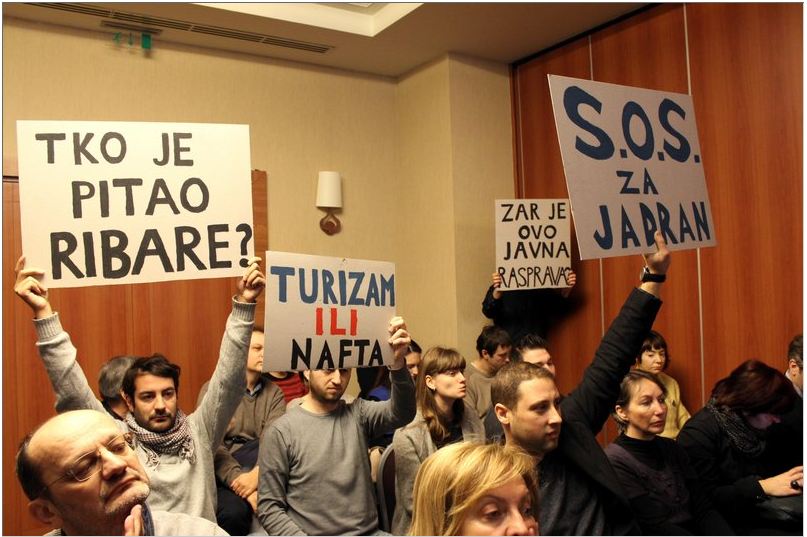A strategic study and a framework plan for the exploration and exploitation of hydrocarbons in the Adriatic Sea were presented in Zagreb on Tuesday and the presentation was organised by the Hydrocarbons Agency.
The most frequent questions by those attending were about the hazards of oil exploitation in the Adriatic, what a disaster caused by it would mean for Croatian tourism and fisheries, and how and if Croatia would ever recover in such an event. The authors of the study presented the effects the exploration and exploitation of hydrocarbons could have on tourism, fisheries, the fauna and the ecology, reiterating that this is an initial version of the study and that all proposals were welcome and would be discussed. The documents presented were roundly criticised by various experts, notably representatives of ecological associations.
According to Sasa Poljanec Boric of the Ivo Pilar Institute, the presentation itself showed that there were many major dangers to the environment. Warning about numerous omissions, she said that tourism, potentially the most at-risk sector, accounted for 15 and not 8% of GDP and that it was drastically unrepresented in the study.
Petar Kruzic, a professor at Zagreb’s Faculty of Science, asked which commission would be in charge of monitoring and if Croatia could hire independent experts. He noted that everything should be more transparent. “Tourism and oil drilling don’t go together, neither do fishing and oil drilling. Can you claim that, if exploitation is launched, there won’t be a disaster in our part of the Adriatic? At this moment, there are more facts against than for oil exploration,” Kruzic said. Hydrocarbons Agency director Barbara Doric said that the exploration of the Adriatic had been going on for 40 years without any accidents.
Numerous participants in the discussion warned that oil drilling in the Adriatic carried far more risks than benefits, asking what would happen if oil erupted in a such a closed sea. They warned that the study covered seismology extremely badly, asking why it did not envisage earthquake monitoring, and criticised the part of the study dealing with noise, which would cause most damage to fish stocks.
The president of the Eko Kvarner association, Vjeran Pirsic, hoped that the authors would significantly improve “the scandalously badly written study”. Dusica Radojcic of Green Istria said the study was so embarrassing that it should be scrapped and that it was written disregarding legislation. Doric countered that everything was done in line with legislation and that the Hydrocarbons Agency was doing everything to protect the Adriatic Sea.
Green activists protest against oil exploitation in Adriatic
Activists of the Green Forum, a national network of environmental protection organisations, on Tuesday staged a protest outside Zagreb’s “International” hotel where officials of the Agency for Hydrocarbons were holding a public presentation of a draft framework plan for gas and oil exploration and exploitation in the Adriatic and a strategic study on the environmental impact of such an activity.
Toni Vidan of the Green Action association and Dusica Radojcic of the Green Istria association said that the study was completely unacceptable because of its shortcomings and that it was a good indicator that Croatian institutions were not prepared for a serious supervision of such a risky and radical project in the Adriatic.
After addressing the press, the activists entered the hotel to attend the presentation of the study, carrying banners with messages against the project. Vidan said that the key shortcoming of the study was the fact that it was made long after the framework plan for hydrocarbon exploration and exploitation was adopted and its implementation started with an ongoing public tender.
He added that the procedure was contrary to the Environmental Protection Act and EU legislation and that it could bring into question possible contracts with oil companies. Radojcic said that the poor quality of the environmental impact study was the reason for demands that it be rejected, adding that it was unacceptable that the monitoring of the environment and possible pollution was being entrusted to concession-holders, namely to oil companies.
The activists called on members of the public and institutions to become involved in the public debate about the environmental impact study and to oppose the document as well as the planned oil exploitation in the Adriatic. The document is available for inspection and the public debate on it lasts from January 16 to February 16, with the Economy Ministry being in charge of the procedure.
